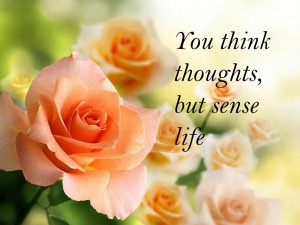What difference does it make if you sense what a person says instead of only listening? My own experience is that is makes a huge difference. When we sense things, we receive much more information than if we only listen.
When we talk about sensing, it is often about the use of our 5 physical senses. But when I write about using our senses, it is sensing in a way that I call ‘holistic sensing’. When you sense holistically, you use your 5 physical senses but also your entire nervous system and your intuition. By using holistic sensing we also perceive the energy behind the message and not only the words. Energy is multidimensional and words are only two dimensional. By receiving the energy behind a message, it becomes possible to pick up additional dimensions.
We can benefit from many situations by searching for the energy in what has been said and done. If we apply holistic sensing when together with others, we will pick up information about how those around us think and feel. In that way, we will get information about the motivation and intentions behind the spoken words. When together with children, it is easier for us to pick up on how the children are doing in situations where they find it hard to express themselves. If we apply holistic sensing on ourselves, we will become increasingly in contact with how we actually are doing and feel, instead of how we are supposed to be doing and feel.
Holistic sensing is in fact just a word for what many people do all the time. But because we don’t have much tradition for talking about what we sense, we often get confused about what we in fact do sense. When we talk to each other, to the boss, colleague, partner, coach, therapist, doctor or any other person, we often assume that what we sense can be put into words and thereby put into the conversation. But what we sense, cannot be put into words, because what we sense is energies. Energies have more dimensions than words, so when energy is put into a verbal conversation some of the dimensions are lost.
Our society could benefit immensely by including sensing and not merely focusing on logical thinking. Our scientific understanding in general but particularly schools, universities and other types of educational institutions could benefit from expanding their approach to teaching by including that students should sense what they are being taught. In this way, new types of conversation would arise and entirely new ways of understanding would appear.
Perhaps you will understand what holistic sensing is by reading this text. But sensing is an individual experience, so you should not only understand what I write you should also sense it. Nobody can tell you what you are sensing by reading this text. Only you know what you are sensing and the impressions it makes on you. Maybe you will start thinking about something when you read my text, maybe the text will remind you of something or maybe you will start to feel something. Only you know.
By being aware of holistic sensing, we get the opportunity to take our first steps towards developing our sensing abilities. And then you have to start sensing every situation you are in and become conscious of what information sensing provides you with. Things will then start to develop and you will perceive much more information from the people around you and your surroundings in general.

